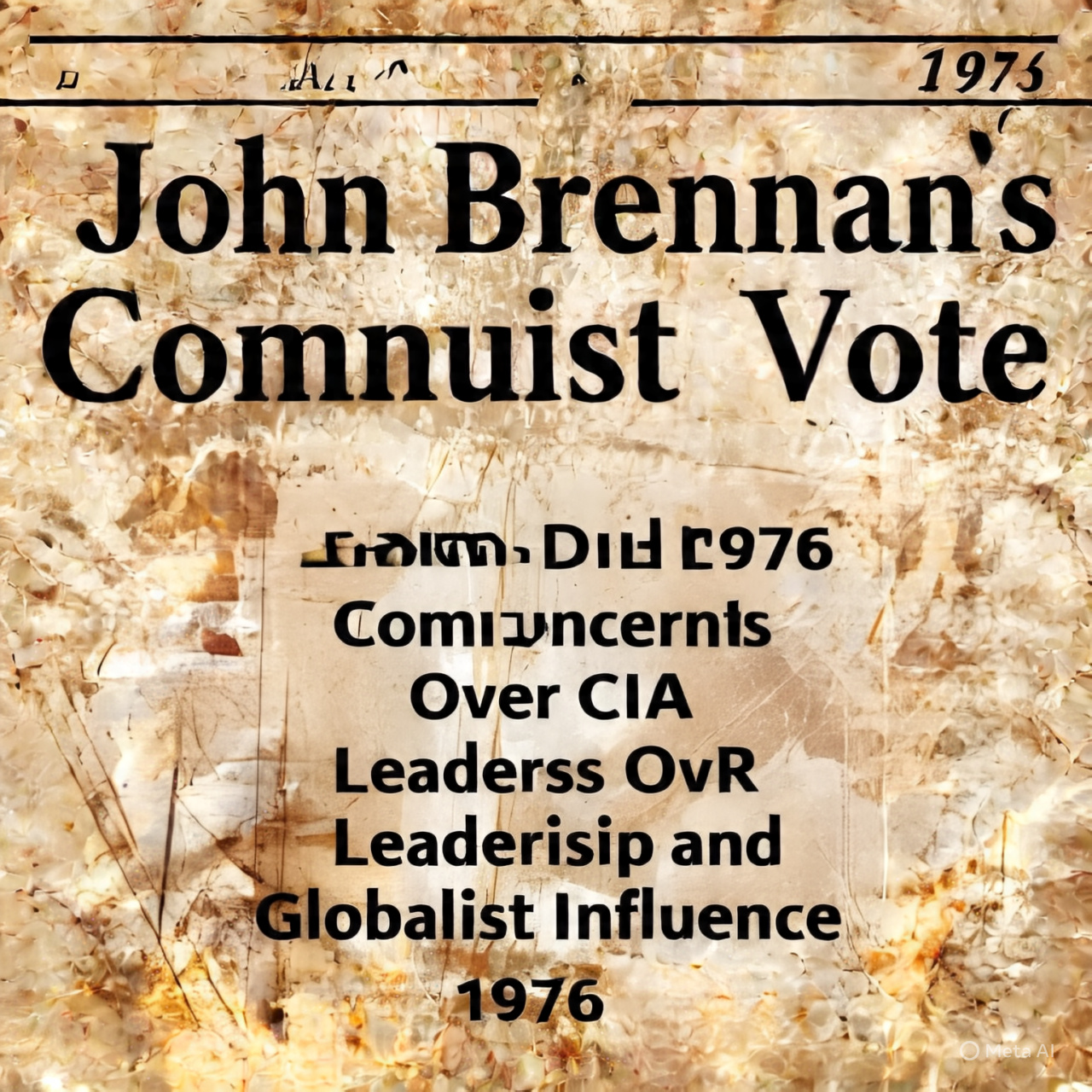
John Brennan’s 1976 Communist Vote Sparks Renewed Debate Over CIA Leadership and Alleged Globalist Ties
Washington, D.C. — Recent revelations about former CIA Director John Brennan’s political history have ignited a fresh wave of debate regarding his ideological leanings, credibility, and the broader implications of his tenure at the helm of America’s premier intelligence agency. Brennan, who led the CIA from 2013 to 2017 under President Barack Obama, publicly admitted in 2016 that he voted for the Communist Party USA candidate, Gus Hall, in the 1976 U.S. presidential election — a disclosure that many critics have found deeply troubling.
In a panel discussion at the Hudson Institute in 2016, Brennan described his youthful vote as an act of protest: “I was unhappy with the system. I wanted change, and I didn’t see the major parties offering it.” While Brennan’s defenders emphasize this was a singular, youthful decision and not indicative of any formal allegiance, the admission has nonetheless raised serious questions about his political judgment and the potential influence of his early views on his later career in intelligence and national security.
The Communist Vote: Youthful Rebellion or Indicator of Deeper Ideology?
Voting for the Communist Party, especially during the Cold War era, carries significant historical and political weight. Gus Hall, the longtime leader of the Communist Party USA, was a controversial figure viewed by many as aligned with Soviet interests. Brennan’s decision to cast a ballot for Hall — even if described as a one-time protest — has been seized upon by critics who argue that it undermines his credibility as a leader entrusted with America’s security.
However, political analysts caution against conflating a single vote with a lifelong ideological commitment. According to experts, voting behavior among young adults often reflects dissatisfaction rather than full ideological alignment (Politifact). Furthermore, Brennan himself has repeatedly denied any ongoing affiliation with communist or socialist organizations.
Brennan’s CIA Tenure: Controversies and Accusations
John Brennan’s career at the CIA spans decades, including high-profile roles such as Homeland Security Advisor and CIA Director. His tenure as CIA Director was marked by several controversies:
- Drone Warfare: Brennan was a key architect of the Obama administration’s drone strike program, which critics argue resulted in significant civilian casualties and raised serious ethical and legal questions.
- Russia Investigation: He was a vocal proponent of the investigation into Russian interference in the 2016 U.S. presidential election, a move that polarized public opinion and fueled political tensions.
- Security Clearance Revocation: In 2018, President Donald Trump revoked Brennan’s security clearance, accusing him of “erratic behavior” and partisanship. The move sparked widespread debate over the politicization of intelligence agencies (Time).
These events have contributed to a divided public perception of Brennan — hailed as a dedicated public servant by some and vilified as a partisan actor by others.
Obama’s Role and Allegations of Globalism
The discussion about Brennan’s past also inevitably raises questions about the Obama administration’s judgment in appointing him to lead the CIA. Critics argue that Brennan’s political leanings, including alleged “globalist” tendencies, were in line with a broader agenda pursued by Obama’s national security team — one that, according to detractors, prioritized international cooperation and globalization over American sovereignty.
“Brennan was Obama’s trusted intelligence figure,” says political analyst Dr. Emily Stanton. “His worldview was shaped by globalist ideals, which some perceive as compromising U.S. interests.”
While “globalist” is often used as a charged term in political discourse, experts emphasize the need to differentiate between international collaboration in security matters and conspiracy theories lacking evidence.
Implications for Intelligence Community Trust
This renewed scrutiny of Brennan’s background feeds into wider concerns about trust and transparency within the U.S. intelligence community. With ongoing debates over political bias, accountability, and the balance between national security and civil liberties, the legacy of figures like Brennan remains a focal point.
“The question is not just about Brennan, but about how political beliefs intersect with public service,” explains Dr. Marcus Lee, a security policy expert. “We must critically evaluate how personal ideology might affect decisions in positions of power.”
Conclusion
John Brennan’s admission of voting for a Communist Party candidate decades ago continues to reverberate through political and intelligence circles. While some view it as a youthful mistake forgiven by time and experience, others see it as a symbol of deeper ideological issues that may have influenced his approach to national security.
As America grapples with questions of loyalty, ideology, and governance, Brennan’s past vote serves as a reminder of the complex human factors behind the faces of power — and the ongoing challenge of ensuring those entrusted with the nation’s safety remain beyond reproach.
Sources:
- Hudson Institute Panel Discussion, 2016 — hudson.org
- Politifact Fact Check on Brennan’s Alleged Communist Party Membership — politifact.com
- Time Magazine on Trump Revoking Brennan’s Security Clearance — time.com
- Expert Commentary: Dr. Emily Stanton, Political Analyst
- Expert Commentary: Dr. Marcus Lee, Security Policy Expert
